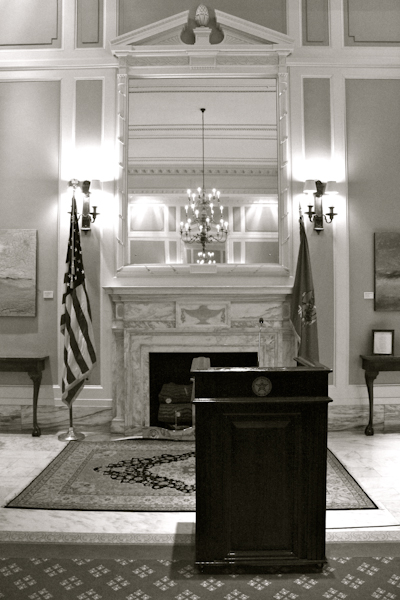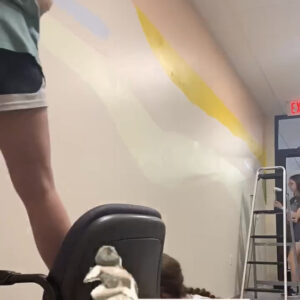Photo by: Amber Smith
With strong internship experience under their belts, Oklahoma Christian University political science majors storm the political scene.
“OC has a great reputation for students with an ethical mind, hard work and critical thinking skills,” Associate Professor of Political Science Raymon Huston said. “Our students have been standouts and truthfully I don’t recommend students unless I know that they are worthy of actually doing the job. … We now have employers and government offices contacting us and saying, ‘Please send us more.’”
According to Huston, Oklahoma Christian history and political science graduates regularly earn 100 percent placement rate into graduate and law school before progressing to their respective fields. Part of this success rate is due to the internship opportunities available to the students while they’re still on campus.
“I was the Public Affairs Intern for Governor Mary Fallin,” senior Austin Hughes said. “I did many things, including dealing with constituents, informing the public about recently signed House and Senate bills, governor’s scheduling, public affairs and on occasion rode around with the governor to her speeches.”
Internships allow students to realize their passions and typically end up opening doors to even more opportunities in their field of interest.
“This internship was quite possibly a big reason why I got the job I am currently at in the State Treasurers’ office,” Hughes said. “Not to say that I wouldn’t have gotten the job without my internship, but it definitely helped and made me realize I wanted to pursue a career in government.”
American Government is a required general education course at Oklahoma Christian for all students, but for political science majors, this course could be an introduction to their livelihood.
“As an outsider, it’s so easy to make sweeping generalizations or exaggerated judgments on a piece of legislation,” senior political science major Rebecca Hobbes said. “But it’s been such a privilege to see how my boss takes a salient issue, such as immigration reform, and works through the process of finding out what would really be the best for his constituents and the American people.”
Hobbes works in the district office of Representative James Lankford as the congressional intern. Working under an active member within a student’s field of study enables the student to fully examine the possibility of their future after graduation.
“At some point in chapel this semester, the speaker said something along the lines of, ‘Happiness is when your vocation meets God’s calling,’” Hobbes said. “I know that the field of political science is the vocation for me. … I’m excited to see where God’s calling leads me on this path.”
Alumni from Oklahoma Christian’s political science program have continued to be very active in their fields.
“I studied politics when I went to OC but I don’t think I really knew it until I was in it,” alumna Thessali Teague said. “There is so much that you learn when you are in the field from people around you and just sort of doing things. … And especially now that I’m up at the capitol, it’s just a different world.”
Politics encompasses a variety of active bodies making a difference in legislation that will affect a wide range of people.
“At the government office, I did constitute services,” Teague said. “I was working there when Mary Fallin passed the open carry law,” Teague said. “So that was a big deal. A lot of people were concerned about carrying guns openly. And we had to kind of talk a lot of people through issues going on in Oklahoma.”
Oftentimes in politics, state and federal governments have intertwining effects among different groups of people. Internships allow Oklahoma Christian students to play a role in the decision-making processes of the smaller-scale legislations that can later become federal issues.
While at graduate school at American University, Teague interned at the Republican National Committee.
“At the Republican National Committee, I worked in the political office and I put together packets for the chairman, Reince Priebus,” Teague said. “Most of those were state briefs. … I would put together a brief for him to take with every little piece of information … that he could possibly want to know: all of the state legislators, all the election results, any elections that were currently going on, any hot topics about politics that he would want to know.”
Teague is currently working with The Journal Record as the Legislative Report Coordinator.
Keeping people informed on political issues and happenings can be a large responsibility that requires attention to detail and excellent communication skills.
“You can learn all the politics that you want in a classroom but once you’re involved in it, it’s a very dirty game,” Teague said. “It’s really political, in every sense of the word. You think that maybe people want to pass legislation for the betterment of your country or your state, but it’s all about who is sliding money under the table. You see that happen right in front of your eyes every day.”
Oklahoma Christian graduates are impacting the political realm with strong virtues of morality and ethics.
“Going to OC prepared me to have more of an ethical standpoint on what I do with my life because politics can drag you down,” Teague said. “From a moral and ethical standpoint, going to a Christian university was so important for going into a field like politics because it is so weighted down by unethical things that happen all the time.
As the political science field of study increases at Oklahoma Christian, politics could begin to be saturated with the ethics and morality of the students it is producing.
“Our students will always excel because of the ethics that we teach here at OC,” Huston said. “… We teach a strong work ethic and critical thinking. I challenge my students in class above and beyond any level of Christianity. I want them to be able to stand up for themselves and have a stronger understanding of what their beliefs are.”
Critical thinking skills acquired in the study of history and political science are essential in a variety of careers and prepare students for success in a global environment.
“I want every one of my students to do [an internship],” Huston said. “Especially if they want to work in a political field because I can teach them theory, [internships] will give them application, plus it will give them connections. … It’s not just what you know, but a lot of it is who you know. And these internships allow them the ‘who you know’ part.”















Be First to Comment